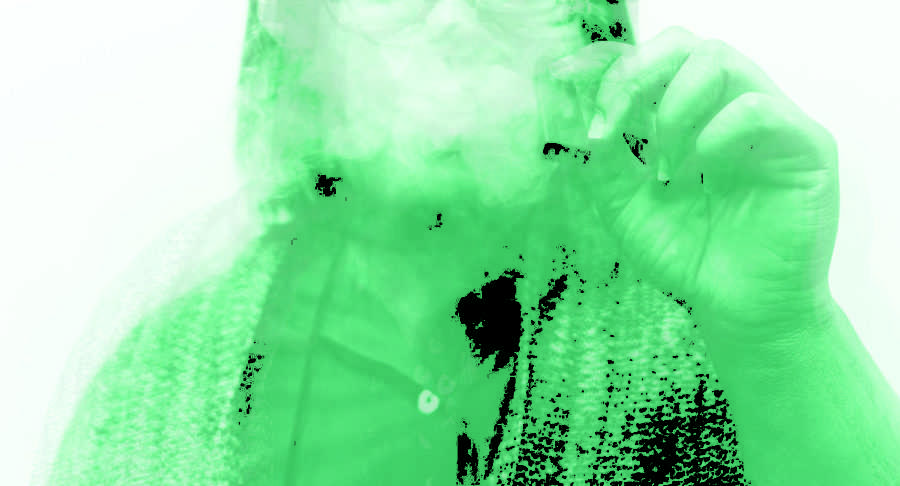The reality of Juuling on campus
February 17, 2019
Juuling is the newest addition in the continuing trend of smoking e-cigarette products being promoted as a healthier option than smoking actual cigarettes.
The Juul, a battery operated device designed to look similar to a USB flash drive, heats up a cartridge containing specialty flavorings and nicotine salts from tobacco leaves. The vapor created from the nicotine salts are then inhaled by the user.
According to the American Academy of Family Physicians (AAFP), the salts are absorbed into the body almost as fast as nicotine from a combustible cigarette.
According to the Juul website, a single Juul cartridge is roughly equal to 200 cigarette puffs. Each cartridge, called a pod, contains 5 percent nicotine, although as of August 2018, a 3 percent nicotine option was added for the mint and Virginia tobacco pods.
A JUUL Labs spokesperson stated that, “JUUL is intended for current adult smokers only. We cannot be more emphatic on this point: no young person or non-nicotine user should ever try JUUL,” the spokesperson said. “Underage use of JUUL and any other vaping products is completely unacceptable to us and is directly opposed to our mission of eliminating cigarettes by offering existing adult smokers a true alternative to combustible cigarettes.”
Cassidy Gabbert, a sophomore and animal ecology major, has vaped and Juuled, but does not consistently smoke either due to her asthma.
“I had a friend once who actually Juuled during lectures,” Gabbert said. “I see people walking all around campus, and they just hide it up their sleeve and then they just Juul when walking to class.”
According to the AAFP website, Juuls have more than twice the amount of nicotine concentrate when compared to other brands of e-cigarettes. This has raised concerns that it may have a higher risk of addiction than other e-cigarettes. One pod has roughly the equivalent amount of nicotine as one pack of cigarettes.
“Your body develops a physical dependency on it and then how you choose to act on that dependency can possibly develop into an addiction,” Gabbert said. “Addiction is the behavior of all dependencies, the biological need.”
According to the Truth Initiative, nicotine is an addictive chemical and evidence suggests that the use of it during adolescence and young adulthood has long-term impacts on brain development.
Kimberly Hem, a senior majoring in English, said she has seen many students using Juuls around Iowa State’s campus.
“The reason they are so widely used is because people thought it was cool, like vaping, and now they’re addicted,” Hem said. “No matter what, I think kids are going to find a way to get their hands on it.”
In a study done by the Journal of the American Medical Association in 2018, it was found that e-cigarettes are less toxic than typical tobacco products, but using e-cigarette products has been shown to increase the likelihood of smoking cigarettes among young people.
According to the Truth Initiative website, in an article on Feb. 5, many young people do not realize Juuls and other e-cigarette products contain nicotine.
According to the article, “The majority of youth e-cigarette users think that the last time they used a product, they vaped only flavoring, not nicotine.”
Alyssa Denny, a senior majoring in child, adult and family services, said she used Juuling as a way to stop smoking cigarettes and vaping.
“I think that they are safer than cigarettes because they don’t have all of the added chemicals that cigarettes do,” Denny said. “I also think they should make some that are nicotine-free for those who are trying to quit but still like to hit their Juul.”
Iowa State follows the Smokefree Air Act policy, put in place on July 1, 2008.The policy states that smoking is not allowed on any ground of Iowa State, including parking lots, buildings and institutional streets like Pammel Drive and Osborne Drive. This policy includes any form of electronic smoking device, e-cigarettes, e-cigars, e-pipes and vape pens that contain or deliver nicotine.
“I don’t think it’s a super big issue, but I definitely do think it is prevalent on campus,” Gabbert said. “Vaping is kind of whatever to me because a lot of people don’t use nicotine when they vape. It can also be a really handy tool for people who are trying to quit smoking because they can change the concentration of nicotine when they are vaping but with Juuling, it’s just strong and I feel like that’s getting more people into smoking.”
Editor’s note: This story has been updated to reflect a statement from JUUL Labs.







